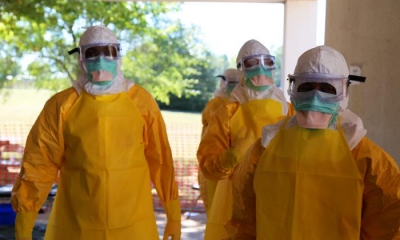News
Some Prairie Vole Brains Are Better Wired for Sexual Fidelity
Researchers at The University of Texas at Austin have found that natural selection drives some male prairie voles to be fully monogamous and others to seek more partners. The surprising contrasts in the animals' brains result from differences in their DNA.
Fish Skin Provides Invisibility in Open Ocean
Scientists have solved a longstanding mystery about how some fish seem to disappear from predators in the open waters of the ocean, a discovery that could help materials scientists and military technologists create more effective methods of ocean camouflage.
Researchers Receive $15 Million for Biofuel Crop Study
Engineering Bacterial Communities Improves Plant Growth
University of Texas at Austin scientists say there's a simple way for home gardeners and small farmers to give plants a pesticide-free boost: by harnessing the power of often helpful bacterial communities known as the microbiomes of plants.
Froggy Went a Courtin'
Marketers and used car salesmen have long exploited a vulnerability in the way we make decisions, called the decoy effect, to get us to buy a certain product, even if our gut instinct is to buy another. Now a graduate student and her advisor in the Department of Integrative Biology have discovered that female frogs are prone to this same kind of irrational behavior when it comes to choosing a mate.
Chink Found in Armor of Invasive Crazy Ant

Tawny crazy ants are taking hold in the United States, swarming in explosive numbers and displacing other wildlife. But scientists from the University of Texas at Austin recently discovered a chink in the insect's armor that could help control the spread of this invasive species.
Scientists Predict which Crops Will Thrive Under Stress
With climate change and population growth putting stable food supplies at risk, finding crops that can thrive in increasingly harsh environments is critical. It's also a challenge, given the difficulty of identifying plants well suited to stressful conditions.
Corals Are Already Adapting to Global Warming, Scientists Say
Some coral populations already have genetic variants necessary to tolerate warm ocean waters, and humans can help to spread these genes, a team of scientists from The University of Texas at Austin, the Australian Institute of Marine Science and Oregon State University has found.
UT Austin Scientist Wins Eminent Ecologist Award
The world's largest society of professional ecologists will recognize Eric Pianka with its top award for achievement in the field.
UT Austin Researchers Evaluate Methodology of Ebola Vaccine Trials
 The waning number of Ebola cases is good news for West Africa, but for those developing a vaccine for the disease, it means time is running short.
The waning number of Ebola cases is good news for West Africa, but for those developing a vaccine for the disease, it means time is running short.
HIV Not As Infectious Soon After Transmission As Thought
People who recently have been infected with HIV may not be as highly infectious as previously believed, a finding that could improve global efforts to prevent HIV transmission and save lives.
Amphibians Join the Genomic Revolution
The dramatic drop in cost and time needed to sequence the genomes of animals over the past decade has revolutionized the study of evolutionary relationships. But for scientists who study amphibians, it feels like the genomics revolution has passed them by. More than 100 complete vertebrate genomes have been sequenced and released—including about 40 mammals, 13 fish, 9 birds and 9 reptiles. But amphibians? Just one.
Supercomputing the Evolution of a Model Flower
Following is an except from an article that originally appeared on the website of the Texas Advanced Computing Center on January 28, 2015:
Always and Forever: A Microscopic Love Story
In the world of living things, surely one of the oddest relationships is the one between certain insects and the bacteria they can't seem to live without. Such bacteria, called obligate symbionts live inside the host's cells. They're distinct organisms -- they have their own DNA separate from that of the host. And yet, if you try to remove the bacteria, the host dies. And vice versa.

































